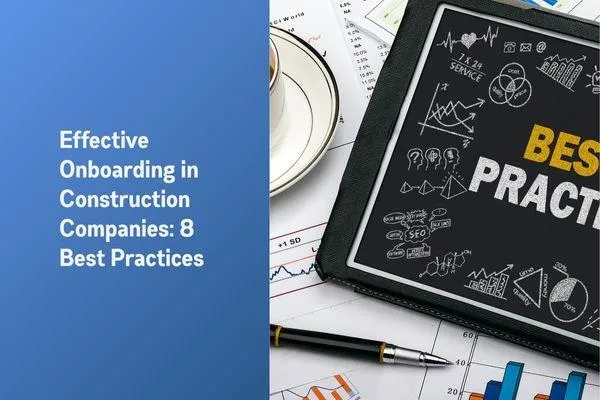
Effective Onboarding in Construction Companies – 8 Practices You Should Know
A new worker shows up at a busy construction site, and he sees tools clattering, machines roaring, and people moving fast. Now what if no one explains where to go, who to follow, or how things work? That first day could feel overwhelming, maybe unsafe at times.
This is where effective onboarding in construction companies makes a difference. When new hires are guided properly from the start, they feel part of the crew rather than an outsider standing on the edge. The truth is, onboarding sets the tone for everything that comes after. If you do it right, it builds trust, confidence, and teamwork from day one.
That’s why in this article, we’ll explore what effective onboarding is in construction companies. We’ll also share 8 best practices to help you welcome new workers the proper way.
Curious what they are? Let’s get started.
Effective Onboarding in Construction Companies – 8 Practices You Should Know
What is Onboarding in Construction?
Why Effective Onboarding Matters in Construction Companies
The 5Cs of Effective Onboarding in Construction Companies
8 Best Practices for Effective Onboarding in Construction Companies
1. Start onboarding before day one
2. Assign clear onboarding roles and responsibilities
3. Focus on safety from the first hour
4. Create a structured first-week plan
5. Pair new hires with a mentor or buddy
6. Teach company culture alongside skills
7. Use hands-on training, not just manuals
What is Onboarding in Construction?
Onboarding is simply the way a company welcomes and trains new workers. But in construction, it’s not as simple as “showing someone the ropes.”
A construction site is a high-risk environment. According to the U.S. Occupational Safety and Health Administration (OSHA), about one in five workplace deaths in the U.S. involves a construction worker, even though construction workers make up a much smaller share of the total workforce.
It’s a wake-up call. It shows why proper onboarding isn’t optional. It gives workers the right knowledge and support before they pick up any tool. So, effective onboarding in construction companies means preparing workers with safety training, job-specific instructions, and team connections that set them up for success.
When done correctly, onboarding lowers accidents, builds confidence, and helps new hires feel like part of the crew, not outsiders. Now that we know what onboarding really is, let’s talk about why it matters so much in this industry.
Why Effective Onboarding Matters in Construction Companies

Construction projects are high-stakes. Every day on site comes with tight schedules, heavy machinery, and serious safety risks. When new workers aren’t guided properly, mistakes slow things down, and they can also put lives in danger. That’s why effective onboarding in construction companies is not optional; it’s essential.
Let’s look at the numbers:
In 2022, about 1 in 5 workplace deaths in the U.S. happened in construction.
According to Gallup, only 12% of employees say their organization does a great job with onboarding, leaving a huge gap to improve.
Strong onboarding programs can improve new-hire retention by 82% and boost productivity by 70%, according to research by the Brandon Hall Group.
These numbers tell us one thing – good onboarding saves lives, saves money, and keeps workers loyal. In construction, that can mean fewer accidents, smoother projects, and crews that stick around. Now, let’s explore a simple but powerful framework that helps make onboarding work: the 5Cs.
The 5Cs of Effective Onboarding in Construction Companies

Every great onboarding program, whether in tech, retail, or construction, rests on the same foundation: the 5Cs. In construction, though, each one has its own twist.
Compliance: This is the non-negotiable part. Safety regulations, PPE rules, and legal policies must be clearly explained immediately. Skipping this step is like building a house without a foundation.
Clarification: Workers need to know their exact role – what tasks they’re expected to do, and how success will be measured. When roles are vague, mistakes multiply.
Culture: Construction teams often work long hours side by side. Teaching company culture (respect, teamwork, accountability) early sets the tone for how people treat each other.
Connection: This is about relationships. New hires need buddies, mentors, or supervisors they can trust. Without connection, workers often feel isolated and leave faster.
Check back: Onboarding doesn’t end after the first week. Regular check-ins, say at 30, 60, and 90 days, help make sure lessons stick and gaps are fixed.
Related article: 11 Recruitment Strategies for Construction Companies to Attract and Keep the Best Talent
8 Best Practices for Effective Onboarding in Construction Companies

Here we'll break down the practical steps that you can use to design a program that works.
1. Start onboarding before day one
A worker’s first impression begins long before they step onto the site. Sending a simple welcome packet or email that explains what to expect can calm nerves and build excitement.
Include a checklist: safety gear needed, reporting time, supervisor’s name, and site location map. Some companies share short safety videos as well, so new hires know the basics before arrival. This early start saves time on paperwork during day one and shows respect for the worker’s time. Moreover, beginning the process early signals that the company is organized, which builds trust from the very start.
2. Assign clear onboarding roles and responsibilities
When no one owns the onboarding process, things get missed. That’s why assigning roles matters. HR can cover contracts, benefits, and general policies. The site supervisor explains the specific job, schedules, and performance expectations.
Safety officers walk through risk protocols and emergency drills. A senior worker can serve as a buddy, answering small day-to-day questions. Dividing onboarding responsibilities keeps things from getting overlooked.
It also helps the new worker know exactly who to approach for what. Clear roles remove confusion and create a team approach, which makes learning feel easier and less intimidating.
3. Focus on safety from the first hour
On construction sites, safety training must start on day one. New workers should learn how to use personal protective equipment, fall prevention steps, and tool handling. Walk new hires around the site, point out hazards, and show emergency exits and first aid kits. Use short hands-on drills instead of long manuals; people remember what they practice.
Teach ladder securing, spotting for heavy equipment, lockout tagout basics, and how to report unsafe conditions. The U.S. Bureau of Labor Statistics reports that in 2022, nearly one in five workplace deaths occurred in construction, and falls were a leading cause across sites.
4. Create a structured first-week plan
The first week is often the most stressful. Rather than overwhelming workers with everything at once, lay out a simple step-by-step plan. Day one might focus on introductions and safety basics. Day two could cover tools and specific tasks. By the end of the week, they should know their role, the site layout, and who to report to.
A written schedule prevents confusion and helps new hires pace themselves. This structured plan reduces mistakes, boosts confidence, and makes workers feel the company has invested in their success. A smooth first week often sets the tone for long-term retention.
5. Pair new hires with a mentor or buddy
Stepping onto a busy construction site can feel challenging. That’s why giving each new worker a mentor makes a huge difference. A mentor explains every task. They guide, encourage, and answer the “small” questions that new hires may hesitate to ask a supervisor.
For example, where to find extra gear, how to log hours, or even the unspoken rules of the crew. This personal support helps new employees adjust faster and feel less isolated. Also, it builds stronger teamwork, because learning directly from an experienced worker creates trust and boosts confidence on the job.
6. Teach company culture alongside skills
Onboarding includes learning how to handle equipment and understanding how people work together. A company’s culture shapes how workers communicate, solve problems, and respect safety rules. New hires should hear real stories about the company’s values, whether it’s teamwork, integrity, or respect for deadlines.
Leaders can set the tone by modeling those values and showing how they apply on-site. When workers know they are part of a culture that values safety and teamwork, they’re more likely to stay committed. Skills get the job done, but culture keeps people motivated and loyal.
7. Use hands-on training, not just manuals
In construction, reading instructions isn’t enough. Workers learn best when they practice under supervision. Supervisors should go beyond manuals or slides by taking new hires to the site, demonstrating tasks, and letting them practice under guidance.
For instance, using scaffolding or handling machinery should be taught step by step with real tools, not only explained in words. Hands-on learning builds confidence and muscle memory, which prevents costly mistakes.
It also shows workers that the company cares about their growth, not just ticking boxes. Real practice turns lessons into lasting skills.
8. Keep checking in after the first month
Many companies stop onboarding after week one; however, learning doesn’t end there. Regular check-ins at 30, 60, and 90 days give workers a chance to share concerns and ask new questions. Supervisors can also see if the training is actually being applied on-site.
These follow-ups help fix gaps before they turn into bigger problems. Plus, they remind workers that the company hasn’t forgotten them after the first week. When employees feel supported over time, they stay longer and perform better. Onboarding isn’t simply a first-day task; it’s an ongoing process that shapes long-term success.
Final Word from Purely Startup
In the construction industry, where safety, efficiency, and team cohesion are paramount, a well-structured onboarding program sets the foundation for success. Taking the time to guide new hires, connect them with mentors, and follow up consistently can reduce mistakes, build confidence, and keep your crew loyal.
By focusing on structured onboarding and the 5Cs, companies create teams that are ready, motivated, and aligned with company culture from day one.
If your construction company wants to communicate processes clearly, train employees effectively, and build engagement that lasts, reach out to Purely Startup. We help businesses design strategies, create content, and implement systems that make onboarding simple, practical, and impactful.


